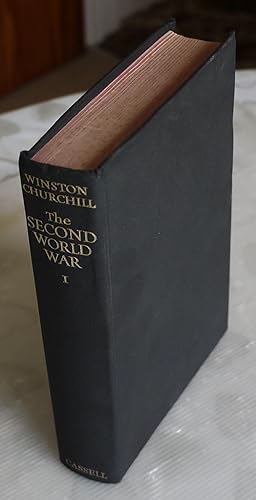

This series takes a look at the history of World War II as it played out before Winston Churchill's eyes. History will be kind to me, for I intend to write it.

Books like Unbroken (linked to my review) offer the student of history so much more because it brings the past to life through someone's personal story. History might tend to make people bored because it is frequently presented in dull fashion. Whenever you mention the word "history" people's eyes tend to glaze over and they overlook the most fascinating stories as a result. It is the first book in the series, all of which I intend to read. (Only this is not a picture of MY book because I would never lay mine out flat and ruin the spine like that!) The Gathering Storm is part of Winston Churchill's series on World War II. On the side here you can see a picture of the edition of the 1948 (Houghton Mifflin Company) edition of The Gathering Storm which I own. Winston Churchill, being a bit verbose, "requires" a diary of me. I've done this with a few books, such as Jane Eyre and Wives & Daughters.


That man was Neville Chamberlain.’ A subsequent article by Churchill himself cites his case from his 1948 book, The Gathering Storm. Using German and British archives, Williamson Murray notes the enormous changes in the balance of power that favoured Germany after Munich: ‘a modest lesson for scholars and others who are contemptuous of military and strategic history, but happy to comment on it when the occasion suits them.’ Michael McMenamin examines the 1938 plot against Hitler, concluding: ‘Only one man could prevent Hitler’s assassination and the forcible overthrow of his regime. Two powerful articles reconsider Churchill’s case. Churchill took the latter view, arguing that in 1938 Britain and France were better prepared to fight and that the Czechs were far more formidable than the Poles, whom Hitler quickly defeated in 1939. The 1938 Munich agreement, which dismembered Czechoslovakia, has been cited both as a strategic delay that allowed Britain more time to arm and a fatal mistake that made Germany stronger when war broke out in 1939.


 0 kommentar(er)
0 kommentar(er)
